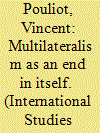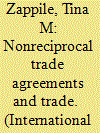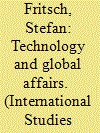|
|
|
Sort Order |
|
|
|
Items / Page
|
|
|
|
|
|
|
| Srl | Item |
| 1 |
ID:
102940


|
|
|
|
|
| Publication |
2011.
|
| Summary/Abstract |
In an effort to enhance the dialog between the literature on casualty sensitivity and that on civilian control, this article offers an integrative analysis that shows how high levels of casualty sensitivity affect the balance of power between civilians and the military. By drawing on the case of Israel during the Second Lebanon War (2006) and the Gaza War (2009), the article demonstrates that casualty sensitivity has a double effect. Initially, it restrains military action because the military internalizes this casualty shyness and, in response, adopts policies of casualty aversion. Thus, casualty sensitivity empowers civilians (at least, dovish civilians) vis á vis the military. However, the military and political leaders' efforts to compensate for these restraints ultimately give the military even more latitude. These efforts involve military doctrines that allow rapid decision making, contingency plans that weaken civilian control, and the military's control over the cost-informed discourse. Casualty aversion thus affects civilian control.
|
|
|
|
|
|
|
|
|
|
|
|
|
|
|
|
| 2 |
ID:
102937


|
|
|
|
|
| Publication |
2011.
|
| Summary/Abstract |
Students and practitioners of world politics need to assess the value of multilateralism not only as a means to an end, but also as an end in and of itself. The functional view, according to which multilateral channels are worth pursuing only insofar as they allow actors to gain influence on the global stage or produce tangible and immediate results in fighting global harms, is incomplete. As a global governance practice characterized by an inclusive, institutionalized, and principled form of dialog, the multilateral procedure generates a number of processual benefits-mutually recognizable patterns of action, typically moderate solutions, and legitimate policies whose large ownership eases their effective implementation-which, taken together, strengthen the political impetus for global cooperation, regardless of the policies adopted. Routinized, nondiscriminatory, and comprehensive political dialog is a pragmatic template for enhancing global governance that can be implemented here and now, as recent developments at the United Nations indicate.
|
|
|
|
|
|
|
|
|
|
|
|
|
|
|
|
| 3 |
ID:
102939


|
|
|
|
|
| Publication |
2011.
|
| Summary/Abstract |
The recent proliferation of preferential trade agreements, reaching almost 400 in number, has made it increasingly important to determine their effects on trade flows. This study advances our understanding of the effect of a particular type of trade agreement, a nonreciprocal agreement between a major economic power and less developed countries often used as a foreign policy/foreign aid tool by the major power and allowable under WTO Special and Differential Treatment. The study tests the effect of a recently implemented nonreciprocal agreement between the United States and sub-Saharan Africa, the 2000 African Growth and Opportunity Act (AGOA), on trade. A traditional gravity model is employed to test whether AGOA opens market access in the United States for eligible countries' exports. The results of this study suggest that AGOA membership and eligibility for AGOA textile benefits have no significant effect on trade, an explicit goal of this agreement. Uncertainty about the expiration of preferences, eroding preferential margins, and the inability of African producers to adequately exploit preferences are explanations for these results.
|
|
|
|
|
|
|
|
|
|
|
|
|
|
|
|
| 4 |
ID:
102938


|
|
|
|
|
| Publication |
2011.
|
| Summary/Abstract |
Technology has always played an important role in global politics, economics, security, and culture. It has continuously shaped the structure of the global system, its actors, and the interactions between them and vice versa. However, theories of International Relations (IR), and in particular those of International Political Economy (IPE), have performed little to theoretically conceptualize technology as a powerful factor within explanations of change in global affairs. Although technology often is implicitly present in the theories of IR and IPE, it is often interpreted as an external, passive, apolitical, and residual factor. This essay argues that to develop a better understanding of transformation in global affairs, technology has to be integrated more systematically into the theoretical discussions of IR/IPE. Technology should be understood as a highly political and integral core component of the global system that shapes global affairs and itself is shaped by global economics, politics, and culture. This paper makes the case for an interdisciplinary approach, which systematically incorporates insights of Science and Technology Studies (S&TS) to provide a better understanding of how technology and the global system and politics interact with each other. In so doing, it opens the field to a richer understanding of how global systemic change is impacted by technology and how global politics, economics, and culture impact technological evolution.
|
|
|
|
|
|
|
|
|
|
|
|
|
|
|
|
| 5 |
ID:
102936


|
|
|
|
|
| Publication |
2011.
|
| Summary/Abstract |
This paper argues that the frequent references to zombies in analyses of the recent global financial crisis can be harnessed as a "teachable moment" for students of Comparative Political Economy. I claim that two zombie movies in particular-Britain's 28 Days Later and Japan's Wild Zero-can be viewed as if they were allegories of two different national forms of capitalism that are integrated into, and affect, the global political economy in different ways. While 28 Days Later displays remarkable similarities to Marxist accounts of the origins and dynamics of capitalism in England, Wild Zero can be seen as an account of the post-1985 dynamics of the Japanese political economy and its engagement with Asia. This paper gives concrete suggestions for the use of zombie films in the classroom. It concludes with the argument that these two films help to explain why references to "zombie capitalism" cross ideological lines.
|
|
|
|
|
|
|
|
|
|
|
|
|
|
|
|
|
|
|
|
|